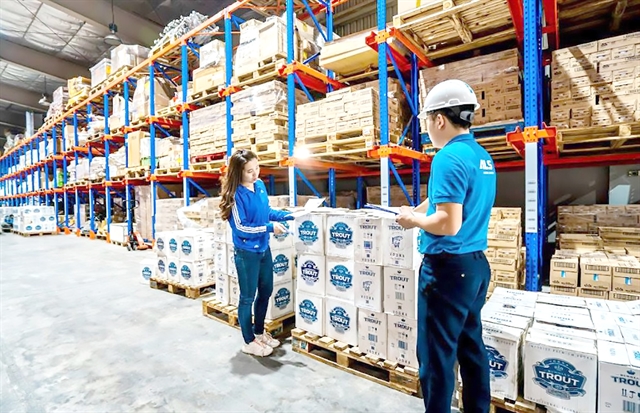 Society
Society

 |
| Staff at a warehouse of ALS Warehouse Services Company Limited (ALSW) in Nam Từ Liêm District, Hà Nội. — Photo hanoimoi.vn |
HÀ NỘI — In order to become a key national and regional logistics hub, Hà Nội is advised to implement solutions applying science, technology and digital technology in the sector.
Nguyễn Hồng Sơn, director of the city’s Science and Technology Department, was quoted by the Hà Nội Mới (New Hà Nội) online newspaper as saying that Hà Nội needed to specify planning for logistics centres and infrastructure to strengthen logistics services in the city.
It had to strive to complete investment procedures, start construction and put into operation important logistics service infrastructure projects such as two Inland Container Depots in Cổ Bi Commune, Gia Lâm District and Đức Thượng Commune, Hoài Đức District; an international container port in Cổ Bi Commune, Gia Lâm District; a postal and delivery centre in Kim Hoa Commune, Mê Linh District; and a number of logistics centre projects in the city during the period of 2021-25, he said.
The city must enhance investment promotion in logistics service infrastructure projects; research and build logistics centres with appropriate scale on belt roads, connecting goods consolidation hubs, warehouses and distribution areas in production, agricultural and industrial zones, he said.
The city was told to concentrate on developing warehouse and specialised warehouse systems, building smart transportation systems transforming logistics infrastructure, and developing a digital platform connecting goods producers, shippers and customers, he said.
Besides, it had to promote logistics linking the Capital Region to other provinces and cities; support professional associations related to logistics services; and attract major global and domestic logistics service providers and enterprises to set up facilities in Hà Nội to make capital a logistics operating centre of the northern region, he said.
Đỗ Phan Anh, deputy head of Transport Management Office under the city’s Department of Transport said that the city was recommended to strengthen the application of modern science, technology and digital technology to overcome the shortcomings of urban traffic.
It was necessary to effectively deploy the Smart Traffic project, build a control mechanism for freight transport units and policies to encourage innovation and improve the quality of goods transport vehicles, and switch to environmentally-friendly transportation methods, he said.
It also needed to form a common trading floor for transport modes, promote the development of logistics services, and help connect freight transport modes to optimise two-way freight transport, he said.
Untapped potential
The city holds the central position of the Northern Key Economic Region, with a synchronous transportation system including road, sea, river, aviation and rail networks.
However, the city’s logistics service development has not yet risen to fulfil its potential.
Deputy director of the city’s Department of Industry and Trade Nguyễn Thế Hiệp said Hà Nội currently had about 25,000 logistics businesses but they only met 25 per cent of domestic demand.
The system of warehouses and logistics centres in the city was still small, lacking connection and specialised goods storage (cool storage, cold storage, document warehouse), he said.
The number of Inland Container Depots was low and only connected by road, lacking other transport links such as railways or waterways, he said.
Plan 332/KH-UBND of the capital People's Committee on developing logistics services in the city this year sets the goal of "Developing logistics infrastructure synchronously with transport infrastructure, civilised and modern commercial infrastructure, making Hà Nội an important logistics hub of the country and the region".
However, Đỗ Phan Anh, deputy head of Transport Management Office, said the implementation of the plan encountered a number of difficulties and challenges, including incomplete infrastructure and traffic jams, as well as an increasing number of transportation vehicles.
All of these affect the quality of delivery services and customer experience, he said.
Bottlenecks in mechanisms, policies, infrastructure, human resources, technology, and especially problems of connection and linkage among logistics services in the city, had led to increasing logistics costs, affecting product prices, export, import and circulation of goods, he said. — VNS




